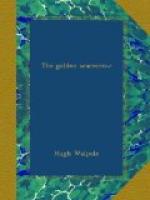The arrangement of the articles was exactly the same as it had been in the earlier days—the royal family in the middle, supported by the jars of sweets; the three books, very dusty and faded, in the very front; and the bootlaces and liquorice sticks all mixed together as though Mr. Roscoe had forgotten which was which.
“Look here, Bim,” he said aloud, “I’ve left you up—I really am going off my head!” he thought. He hurried away. “If I am mad I’m awfully happy,” he said.
III
The white vicarage gate closed behind him with precisely the old-remembered sound—the whiz, the sudden startled pause, the satisfied click. Seymour stood on the sun-bathed lawn, glittering now like green glass, and stared at the house. Its square front of faded red brick preserved a tranquil silence; the only sound in the place was the movement of some birds, his old friend the robin perhaps in the laurel bushes behind him.
Although the sun was so warm there was in the air a foreshadowing of a frosty night; and some Christmas roses, smiling at him from the flower beds to right and left of the hall door, seemed to him that they remembered him; but, indeed, the whole house seemed to tell him that. There it waited for him, so silent, laid ready for his acceptance under the blue sky and with no breath of wind stirring. So beautiful was the silence, that he made a movement with his hand as though to tell his companion to be quiet. He felt that they were crowded in an interested, amused group behind him waiting to see what he would do. Then a little bell rang somewhere in the house, a voice cried “Martha!”
He moved forward and pulled the wire of the bell; there was a wheezy jangle, a pause, and then a sharp irritated sound far away in the heart of the house, as though he had hit it in the wind and it protested. An old woman, very neat (she was certainly a Glebeshire woman), told him that Mr. Trenchard was at home. She took him through the dark passages into the study that he knew so well, and said that Mr. Trenchard would be with him in a moment.
It was the same study, and yet how different! Many of the old pieces of furniture were there—the deep, worn leather arm-chair in which Mr. Lasher had been sitting when he had his famous discussion with Mr. Pidgen, the same bookshelves, the same tiles in the fireplace with Bible pictures painted on them, the same huge black coal-scuttle, the same long, dark writing-table. But instead of the old order and discipline there was now a confusion that gave the room the air of a waste-paper basket. Books were piled, up and down, in the shelves, they dribbled on to the floor and lay in little trickling streams across the carpet; old bundles of papers, yellow with age, tied with string and faded blue tape, were in heaps upon the window-sill, and in tumbling cascades in the very middle of the floor; the writing-table itself




